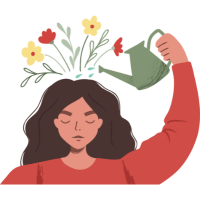How do we find success in the Library and Information Science (LIS) profession? Michael Stephens (2019) presented an equation to help break down the necessary elements:
Essential Skills + Mindset2 × Support = Success
The first element of this equation comes from formal and informal education, including MLIS courses as well as professional and general life experience. While this aspect is just as vital to success as the rest, I found myself reflecting more on both mindset and support as they relate to learning experiences. For me, the former breathes life into practice and the latter provides solid ground from which to continue that practice. So how do we address these ideas?
 Mindset
Mindset
Our approach to the LIS profession must be reflective and intentional. Stephens (2025) connected a series of concepts for what he referred to as soft skills or “❤️ skills”. Many of them resonated with me as ways to focus my mind – and heart – on the work ahead. Through curiosity, creativity, balance, and compassion, we can connect with people, explore deeper, and develop new ideas. I hope I’m not assuming too much by saying that I think most of us are here because we care about and want to help people. This is certainly true for me. However, it can be almost too easy for me to care so much that I end up with a great deal of compassion fatigue and I need time to get back to those ❤️ skills.
 Support
Support
Institutional leadership can help with professional growth through transparent communication and inclusive management practices. It’s also important that leadership is adaptable and open to new ideas – after all, the success of the staff can mean the success of the organization. This ideal scenario isn’t always reality, though, and the stress and setbacks of navigating professional growth without that support can be overwhelming. Hopefully, as long as we can hold onto our positive mindset, we have the capacity to guide our own professional development. This is where strategic, curious, and skeptical learners can navigate professional learning experiences in their own ways (Stephens, et al., 2021).
The important thing to remember is that we don’t just obtain the skills, mindset, and support to be successful and then move on. We are constantly learning and adapting, for our own knowledge-building and to prepare us to use our learned skills for the people we are committed to serving. Finding ways to continue this work while also maintaining healthy self-care practices is also essential. Professional learning experiences can be found in formal conferences, individual resource exploration, and in partnerships or mentorships with other LIS professionals. Whichever is your preferred method of learning, be curious, be creative, find balance, and greet the world with compassion. Happy learning!
References
Stephens, M. (2019). Wholehearted librarianship: Finding hope, inspiration, and balance. ALA Editions.
Stephens, M. (2025). [Video lecture on reflective practice.] Retrieved July 24, 2025, from the course site for INFO 287: The Hyperlinked Library at San Jose State University.
Stephens, M., Partridge, H., Davis, K., & Snyder, M. (2021). The strategic, curious & skeptical learner: Australian public librarians and professional learning experiences. Public Library Quarterly.
Leave a Reply